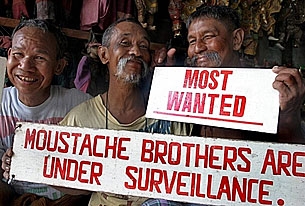"We perform for tourists at home," Lu Maw, of the Moustache Brothers comedy team, said in an interview. "Last night there were nine tourists, and the day before there were five. They will come again today as well."
Lu Maw and Par Par Lay said they are performing at their home in Mandalay for tourists visiting during this year's Thingyan, or water festival, a major event in Burma.
"As we do not have a permit, there is nothing we can do outside in public," Lu Maw said. "We are not allowed to perform on stage."
Since 1975, we have been mentioned in the tourists' guidebooks."
Lu Maw
"But we perform for the tourists at home," he added.
Lu Maw said that authorities have never specified the length of a 2001 ban on their act, which consists of absurdist and irreverent comic dialogue interspersed with traditional Burmese singing and dancing.
Sent to prison
Lu Maw said the ban was sparked by a performance at the compound of Nobel laureate and opposition party leader Aung San Suu Kyi, currently under house arrest in the former capital, Rangoon.
During the performance, Par Par Lay and Lu Zaw joked that government-backed cooperatives were the same as thieves, and sang a comic song about Burma's ruling generals.
"To cut the story short, in 1996 we performed at Daw Aung San Suu Kyi’s compound," Lu Maw said.
"Lu Zaw and [my brother] Par Par Lay performed there making a lot of jokes at the Independence Day celebrations in her compound."
"When they came back, they were arrested in Mandalay. They were sent to jail for seven years and were interned in the Myitkyinna prison where the other comedian Zargana is also interned. Since 1975, we have been mentioned in the tourists' guidebooks. So the tourists have been attending our performances since then," he said.
Zargana was detained after he openly criticized the regime’s slow response in helping survivors of a devastating cyclone that killed
at least 78,000 people, with another 56,000 listed as missing.
Lu Maw said they had told government officials that if they wanted to close them down, they would have to stop the tourists at their door and turn them away themselves.
"We told them that these tourists come to our home day and night, but
they would not accept it," he said.
"They just told us not to perform at all."
Private performances at home
Lu Maw said he and Par Par Lay had already prepared a routine for the Thingyan water festival, during which it is customary to take special care of one's elders.
During the dialogue, performed over the telephone for RFA's Burmese
service, he and Lu Maw discuss plans for offering water to the elders.
"That is good," quips Lu Maw. "So that you will get back your permit to perform very soon."
"Yes," replies Par Par Lay, "but not to a lot of them. Only to about 10 or 15 of them. After all, money is tight these days."
Par Par Lay then says that, according to tradition, he will make a traditional peace offering of pickled tea leaves, known as laphet, which the government warned recently had in some instances been contaminated with chemical dyestuffs from the textile industry.
"Laphet?" says Lu Maw, quizzically. "Wait a minute, is your laphet clean?"
Par Par Lay continues: "I cut their fingernails, I also cut their toenails, I shampoo their heads, I clean their ears, and at the end I ask them to pay for the cost of the services I have just given to them," he says, calling up images of Burma's rampant official corruption.
Moving from political irony to double-entendre, Par Par Lay says he will make chicken curry for a special meal for the elders, for which purpose "they were doing the business with two chicks in the kitchen."
When the chicken curry is brought out, he continues, one of the elders, who is about 75 or 80 years, starts to bow down and pay his respects to the chicken curry.
"So I asked that elder why he was doing that. He replied he was pretty sure that the hen must be older than him, because it was so tough he could not even chew on it."
Nargis aid
And in an apparent dig at the "disappearance" of international aid donations to victims of last year's devastating Tropical Cyclone Nargis, Par Par Lay reeled off a list of gifts made to his family for the festival.
"Well, I also donated to each of them one bag of rice, one barrel of
oil, a bed, a mosquito net, a mat, a mattress, a pillow, toothpaste and
a toothbrush, a blanket, a towel, and all kinds of things," he said.
"So much so that the children and the grandchildren of the elders could not carry the stuff."
Asked by Lu Maw why they couldn't carry the "donations," he replied. "I just wrote down the words on the ground."
Original reporting in Burmese by Nay Rein Kyaw. Burmese service
director: Nancy Shwe. Translated by Soe Thinn. Written for the Web in
English by Luisetta Mudie. Edited by Sarah Jackson-Han.
